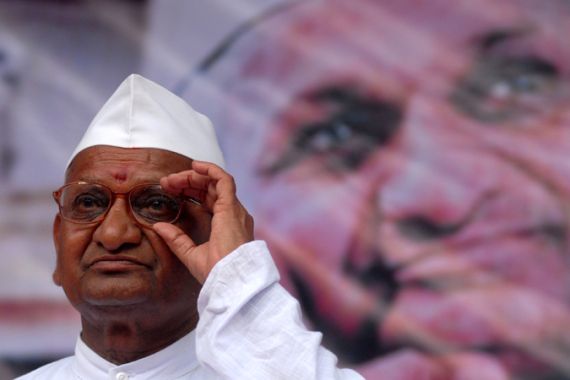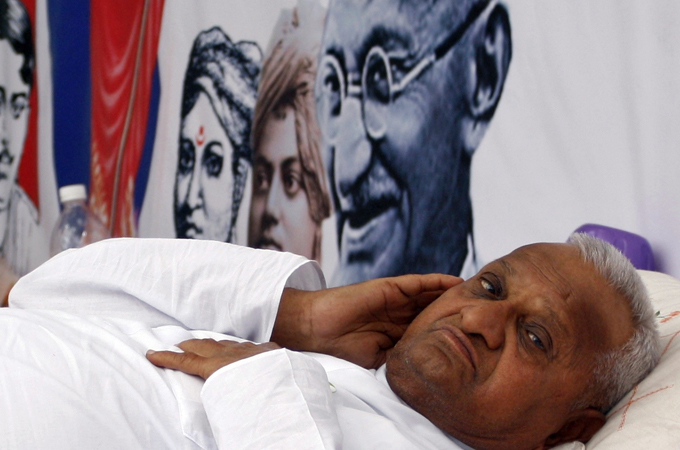Profile: Indian activist Anna Hazare
Jailed activist has become one of the most prominent leaders of a growing anti-corruption movement in India.

 |
|
Many activists and journalists have termed Hazare’s proposed ombudsman as “draconian and overarching” [Reuters] |
Anti-corruption campaigner Kisan Baburao, popularly known as Anna Hazare, has emerged as one of the biggest heroes for middle class Indians today.
Although he has been involved in anti-graft programmes in his home state of Maharashtra for decades, Hazare was only catapulted to national fame in April, when his highly publicised fast-unto-death galvanised people across the nation on the problem of corruption.
His hunger strike came at an opportune time; when India’s federal government was already under attack from opposition parties over a series of scandals that cost the state close to $40bn.
Many Indians found a common cause in Hazare’s call for an anti-corruption ombudsman, known as Jan Lokpal Bill. After the success of the April hunger strike, “Anna” is a household name.
His supporters now ranges from Bollywood stars to former bureaucrats and includes many prominant social activists.
But others have been wary of Hazare’s proposed ombudsman, and have termed the concept “draconian and overarching”.
Even Santosh Hegde, a retired judge and an aide to Hazare, acknowledged he had “objections” to certain clauses in the bill.
Hegde is said to disgree with its directives to the judiciary, inculding the provision of life imprisonment as punishment under the Prevention of Corruption Act, among other issues.
In 1991, Hazare launched the People’s Movement against Corruption (Bhrashtachar Virodhi Jan Aandolan), a grassroots campaign to fight graft in Ralegan Siddhi, his home village in Maharashtra state.
In 1995, his campaign forced the then-state government of Maharashtra to drop two ministers from its cabinet on corruption allegations.
In 2003, his hunger strike against four tainted ministers forced the state government to form a commission to probe his allegations.
Hazare’s arrest
Hazare’s arrest this week, one day after the 65th anniversary of India’s independence on August 16, infuriated his supporters and led to spontaneous protests across the country.
Manmohan Singh, India’s prime minister, told parliament Hazare’s intention to fast indefinitely to push for reform was a direct challenge to the government’s authority.
“The path he has chosen is totally misconceived and fraught with grave consequences for our parliamentary democracy,” Singh said.
Today, Hazare, 74, is being compared with India’s biggest icon of non-violence and the struggle for freedom, Mahatma Gandhi.
But Gandhi’s great-grandson, Tushar Gandhi, has pointed to differences in the way the two leaders have used fasting as an instrument of protest.
“Hazare’s fast is different because Bapu’s [Gandhi’s] fast was to reform an adversary into a friend, while Anna’s fast is against an enemy. It is like a me-versus-you kind of thing,” Tushar Gandhi told India’s Press Trust of India news agency.
Salil Tripathi, an Indian journalist based in London, wrote in www.thedailystar.net: “And remember, Hazare is no angel. Hazare wants to eradicate the consumption of alcohol in the village where he has worked, and when people have defied that, his followers have meted out corporal punishment.
“His views on women are patronising and chauvinist, and his methods frequently un-Gandhian. While claiming to be non-partisan, he has become a political player, with politicians from the opposition Bharatiya Janata Party backing him strategically.”
Hazare, a former army driver, is known for improving the economy and environment of his village. In 1992, he was awarded the Padma Bhushan, the third-highest civilian award, for his work.
In the early 2000s, Hazare led a movement in his home state that forced the state government to pass a stronger Maharashtra Right to Information Act. The campaign later formed the basis of the federal Right to Information Act adopted in 2005.
Hazare, who has never married, once was reported to have attempted suicide because he was frustrated with life. Thankfully, however, that one lifeline has infused new life to the anti-corruption movement in the country.
But he has not been far from controversy. In April, he praised Narendra Modi, a right-wing politician, accused to have been involved in communal riots in the state of Gujarat.